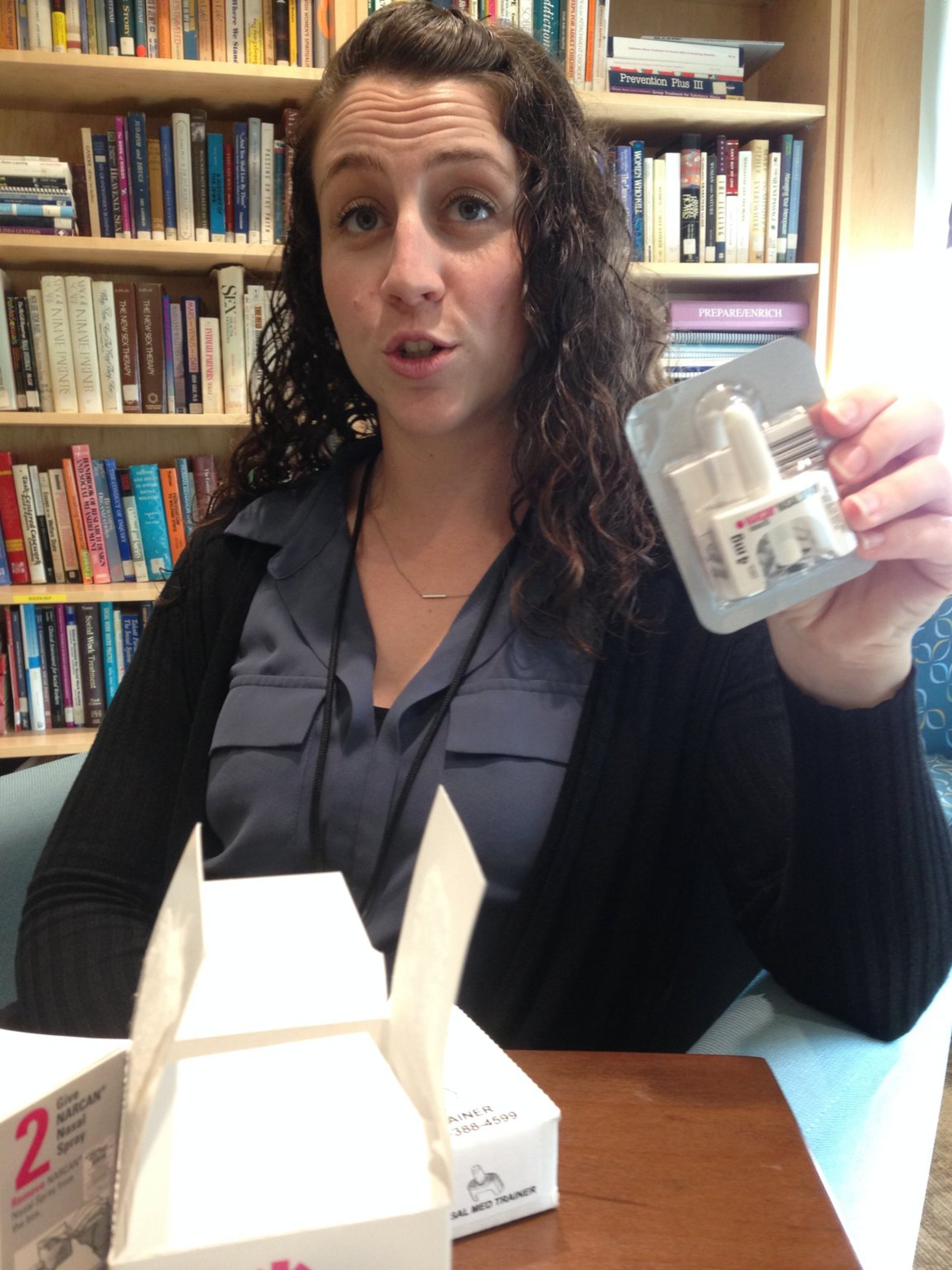This Life with Gracie: Jewish program manager’s personal story informs work in opioid crisis

For years now, we’ve been hearing about the opioid epidemic and the devastation it has wrought here and across the country.
No race, no religion, no age group, no community has been untouched.
If you ever talked to anyone in the Jewish community, though, you might have missed that fact.
Drug addiction is still a taboo topic fraught with shame, said Mandy Wright, program manager of HAMSA. or Helping Atlantans Manage Substance Abuse, a program of Jewish Family & Career Services Atlanta.
Wright knows this perhaps better than most people running substance abuse programs because she’s lived it, felt the impact on herself and her family.
She was in middle school in San Diego when she came home one day to find her mother tearing through her brother’s room and finding drugs. He wasn’t just using, she discovered he was selling whatever he could get his hands on to support his heroin habit.
She was 13. Her big brother was 17.
RELATED: Should parents force their children to submit to random drug tests?
Up until then, he was just the “difficult” kid who required more of their parents’ attention, who seemed to keep her family on edge as they discussed him in hushed tones that she was never privy to.
Wright somehow managed to cope in her brother’s shadows like she’d always done.
“I was pretty self-sufficient,” she said. “There was no room for error because mom and dad were always stressed. If I achieved, I got attention for it, but they made the choice to put their energy where it was needed the most.”
Meanwhile, Wright managed to finish high school and go off to college, graduating in 2013 with a bachelor of science degree in psychology from the University of Phoenix before landing a job and then, on a whim, moving to Johns Creek with her then-2 1/2-year-old son.
She had been here just two weeks when she was offered a job at JF&CS Atlanta, a nonprofit charged with building and running a program to help recent college grads who couldn’t find work.
By then HAMSA, the Jewish community’s go-to resource for addiction, was four years in the making. In their efforts to raise awareness and expand their reach, the program coordinators were taking every opportunity to visit day schools and synagogues to talk about substance abuse and HAMSA.
It was well known that drug addiction was a part of Wright’s story. She had experience expanding programs. She understood the Jewish community.

In January, she was tapped to head the program. She knew instinctively that could be either incredibly overwhelming or motivating.
RELATED: Church families open homes to children caught in opioid crisis
Wright asked for some time to think about it. The more she thought about the pros and cons, the more she realized how her experiences growing up with an addict, in a family that spent years in denial, could be used for good.
“Whatever it would bring up for me to step into this role, it was worth it,” she said.
Every day, 117 people die from an opioid overdose in the United States. Georgia ranks 11th among states for the most opioid overdose deaths.
Last year alone, 6,700 people received clinical services at JF&CS. Many of those needed help with drug addiction — either their own or a loved one’s. JF&CS’ counselors had full caseloads dealing with this issue, so the need is great.

According to Wright, HAMSA runs two support groups specific to addiction, one for people in recovery and another for family members. HAMSA also offers a free information and referral hotline: 1-833-HAMSAHELPS (1-833-426-7243) to help people navigate the vast system of resources. Because treatment options are traditionally not aware of Jewish customs, one of HAMSA’s key offerings is Jewish sensitivity training.
RELATED: Mother overdoses on heroin in store bathroom with child nearby
HAMSA also works to build a bridge between Judaism and recovery, hosting sober Jewish holiday offerings, like the sober Passover Seder. A traditional Seder often includes drinking four glasses of wine, so HAMSA has created an offering more suited to those in recovery.
The program also provides Narcan education, and supplies the overdose antidote at no cost to partner organizations. Their efforts coincide with the U.S. surgeon general’s recent public health advisory explaining the importance of people knowing how to use and keep the medication within reach.
Narcan is positioned strategically around JF&CS’ Dunwoody headquarters, its Cobb County office and its Ben Massell Dental Clinic in Midtown.
They also plan to offer community-based training in partnership with the Dunwoody Police Department.
“This epidemic doesn’t have a demographic or a ZIP code or a religion,” Wright said. “Many of the calls we get to 1-833-HAMSA-HELPS are from family members who don’t know where to turn. It is such an overwhelming place to be in, and we are here to help anyone who is affected by addiction. They deserve support, not shame.”
The HAMSA hotline provides callers with free, detailed recommendations and contacts for resources around Atlanta that have been vetted by HAMSA staff based on the unique needs of each caller.
Wright’s brother unfortunately is still in the throes of his addiction.
Every day at HAMSA is a constant reminder of his battles and how it affected her growing up. Some people might see that as an unbearable burden. Mandy Wright, though, says it’s been a gift to step into this role and help ease the pain for others going through it.
“It gives me back some power over addiction,” she said. “I get to choose what that looks like. Having watched my parents struggle, I want to be the difference for others.”
Find Gracie on Facebook (www.facebook.com/graciestaplesajc/) and Twitter (@GStaples_AJC) or email her at gstaples@ajc.com.


